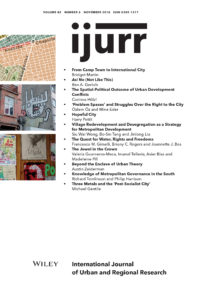Building on roughly ten months of ethnographic and archival research, this article examines successful resistance to a planned redevelopment project along Avenida Chapultepec, one of Mexico City’s historic boulevards. Local residents and their allies objected not only to the specifics of the project but also to its planning process, in which citizen input was foregrounded but extremely limited. This case illustrates the instantiation of a ‘postpolitical condition’ in Mexico City, a situation in which any opportunity for dissensus has been foreclosed and ironically replaced by a growing set of carefully managed participatory schemes and an ever‐greater rhetorical commitment to democratization. The public contest over the so‐called Corredor Cultural Chapultepec effectively demonstrates two claims I seek to advance in this article. The first is that strategic vulnerabilities of such political orders can be effectively sought in their conditions of emergence or the contextually specific ways that such orders consolidate political power. The second is that in seeking to elucidate and challenge these conditions, resistance must account for the ways in which certain ‘partition[ings] of the sensible’ (Rancière, 2010) operate at the quotidian level of attitudes, norms and routines to assign and continually reproduce the places and roles of urban citizens.

